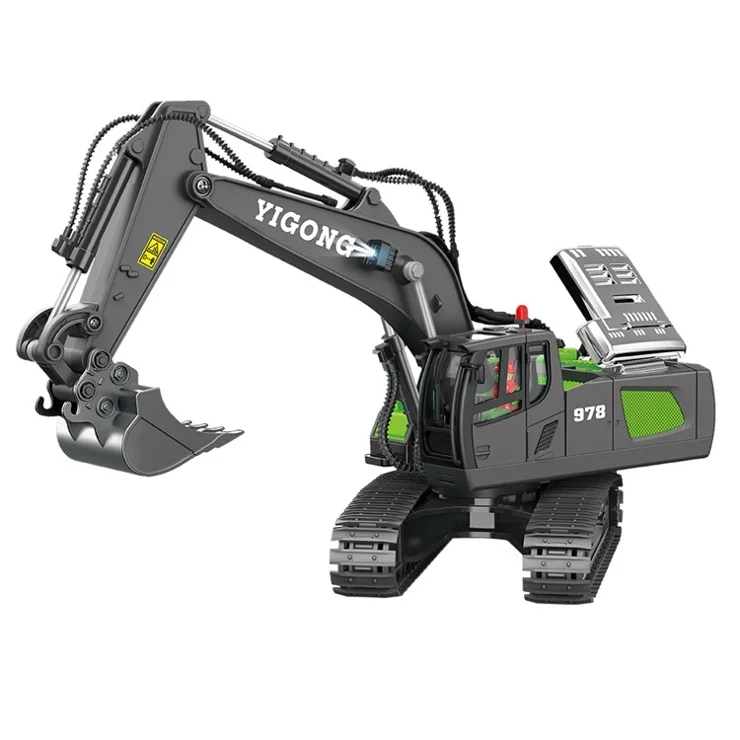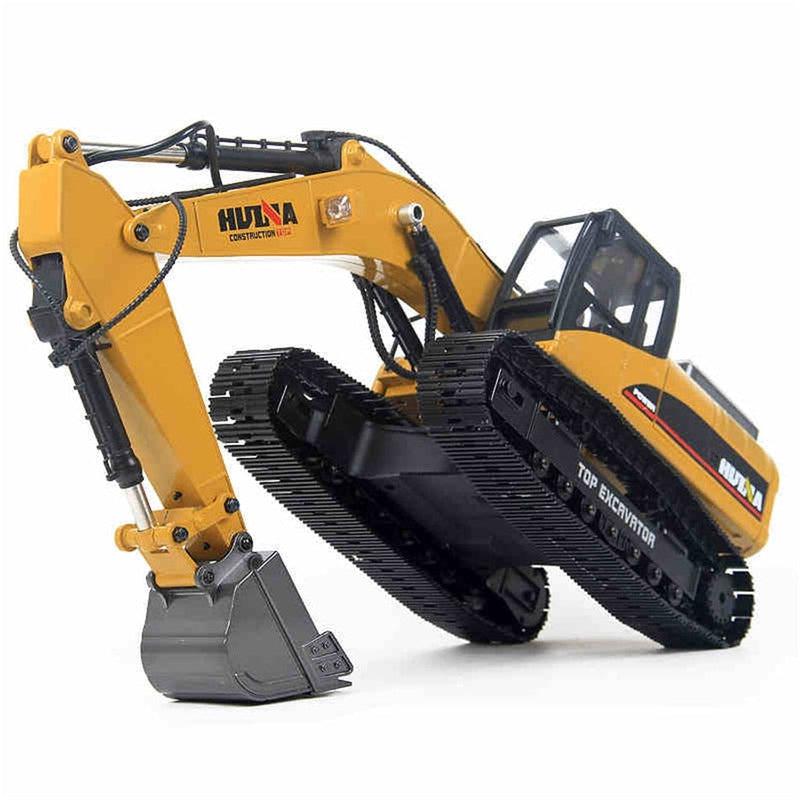Exploring the Features of a rc excavator for Enhanced Site Preparation
Recognizing Exactly How Excavator Functions and Its Influence On Performance
Excavators play a necessary duty in building and mining operations, depending on an intricate interplay of hydraulic and mechanical systems. Their ability to do a variety of tasks rests on both their layout and the innovation integrated within. Understanding these parts can significantly impact functional effectiveness and productivity. As innovations continue to improve the market, one should take into consideration exactly how these changes will certainly influence future techniques and performance.
The Essentials of Excavator Mechanics

The Role of Hydraulic Solutions in Excavators
At the heart of excavator procedure exists the hydraulic system, which plays an essential function in powering the equipment's functions and activities. This system makes use of pressurized hydraulic liquid to move energy, allowing different actions such as training, excavating, and swinging. By taking advantage of the concepts of hydraulics, excavators can perform tasks with amazing accuracy and pressure, enhancing general functional efficiency.The hydraulic system includes key components, including pumps, valves, and cylinders, which collaborate to control the flow and direction of the liquid. When the driver involves the controls, the hydraulic liquid is routed to details cyndrical tubes, translating the driver's commands right into physical activity. This device permits responsive and smooth actions, which are vital in building and excavation environments. double e volvo rc excavator. The effectiveness of the hydraulic system straight influences the performance and adaptability of the excavator, making it an essential element in modern-day excavation processes
Secret Elements of an Excavator
Understanding the essential parts of an excavator is necessary for comprehending exactly how this powerful equipment operates. An excavator consists of numerous considerable aspects, including the undercarriage, home, boom, arm, and container. The undercarriage provides stability and mobility, usually featuring wheels or tracks to browse various terrains. The residence includes the engine and hydraulic systems, permitting the driver to regulate movement and power the machine. The boom expands from the residence, allowing upright reach, while the arm connects to the bucket, assisting in excavating and lifting operations.Additionally, the taxi houses the driver, furnished with controls for specific maneuvering. Each of these elements plays a vital duty in the excavator's overall functionality, contributing to its efficiency and efficiency on building and construction sites. Understanding these parts helps in maintaining and enhancing excavator efficiency, making certain tasks are completed securely and effectively.
Accessory Convenience and Its Advantages
Add-on versatility is a crucial aspect of excavators, allowing drivers to switch over in between various tools tailored for certain jobs. This adaptability not only boosts work performance yet additionally adds to cost-effectiveness by lowering the demand for numerous equipments. Understanding the different kinds of add-ons readily available can greatly impact the overall performance and functionality of an excavator on job sites.
Kinds of Attachments
While excavators are mainly acknowledged for their digging abilities, their true flexibility depends on the vast selection of add-ons readily available. These add-ons improve the excavator's capability, permitting it to carry out various jobs beyond excavation. Common accessories include buckets (for digging and scooping), hydraulic thumbs (for grasping products), and augers (for piercing holes) Grapples are utilized for relocating and managing debris, while rippers can separate tough surface areas. Other specialized attachments, such as trenchers and plows, enable excavators to adjust to particular job needs. This diversity not just enhances the machine's energy throughout various fields, including landscaping, building, and demolition, however additionally enables drivers to customize their devices to fulfill details task demands effectively.
Raised Job Performance
Making the most of work performance is a primary advantage of making use of numerous excavator attachments. Various attachments enable an excavator to execute numerous jobs without needing to switch over equipment, conserving beneficial time and labor. For example, making use of a hydraulic hammer can break concrete while a container add-on can excavate dirt, enabling a seamless operations. This versatility minimizes downtime linked with equipment changes and improves efficiency on-site. Furthermore, specialized accessories boost accuracy in jobs such as grading or landscaping, resulting in higher quality results. The capability to adjust to numerous job requirements not just simplifies operations but also lessens the demand for added equipment, ensuring that projects are completed swiftly and efficiently. On the whole, attachment versatility considerably contributes to boosted task effectiveness in excavation job.
Cost-Effectiveness and Adaptability
Cost-effectiveness is a considerable advantage of utilizing functional excavator add-ons. These add-ons permit a solitary excavator to do several tasks, decreasing the need for additional machinery and labor - double e volvo rc excavator. By switching over in between pails, hammers, and grapples, drivers can take on various tasks, from excavating to demolition, therefore maximizing tools application. This versatility not just lowers functional expenses but also decreases downtime connected with transforming devices. In addition, the capacity to tailor excavators with specialized accessories enhances efficiency, as they can effectively deal with varied tasks according to task demands. To end, the mix of cost-effectiveness and adaptability in excavator attachments adds to enhanced functional efficiency and source allocation in building and construction and excavation projects

Advanced Innovation in Modern Excavators
Modern excavators are increasingly geared up with advanced modern technology that transforms excavation processes. Automation simplifies operations, while enhanced gas effectiveness reduces functional expenses. Additionally, clever control systems boost precision and safety, noting a significant advancement in excavation devices.
Automation in Excavation Processes
As excavation technology advances, automation has actually become an essential element in boosting efficiency and accuracy on job websites. Modern excavators are geared up with innovative automated systems that help with jobs such as grading, digging, and trenching with very little operator intervention. These systems make use of sensors, GPS, and equipment knowing formulas to guarantee accurate placing and deepness control, significantly lowering the margin for error. Furthermore, automation permits drivers to concentrate on tactical decision-making instead of manual controls, causing boosted efficiency on the whole. Such innovations not only simplify workflows but likewise boost safety by reducing human mistake in intricate operations. Consequently, the combination of automation in excavation procedures stands for a considerable development in building and a knockout post construction modern technology, driving the sector in the direction of higher performance and performance.
Enhanced Fuel Efficiency
Developments in innovation have also resulted in significant improvements in fuel efficiency for modern excavators. Modern machines are furnished with innovative engines that optimize power result while lowering fuel intake. These engines make use of ingenious burning innovations, such as turbocharging and straight gas shot, to boost efficiency and performance. Furthermore, lightweight products in building and construction minimize general weight, permitting less energy expenditure during operation. The introduction of variable rate controls allows operators to adjust engine efficiency according to certain tasks, even more minimizing gas use. Consequently, these enhancements not just lower functional expenses but also add to environmental sustainability by reducing exhausts. In general, enhanced fuel efficiency in excavators is an important growth that boosts productivity and financial practicality More about the author in the building and construction market.
Smart Control Systems
While drivers navigate significantly complex work sites, wise control systems in excavators have actually emerged as necessary tools for improving efficiency and accuracy. These advanced innovations make use of algorithms and sensors to check different criteria such as load weight, surface problems, and operational performance. By instantly adjusting hydraulic functions, clever systems optimize maker efficiency, causing boosted productivity and lowered wear on elements. In addition, operators take advantage of instinctive interfaces that supply real-time responses and diagnostics, permitting notified decision-making. This integration of modern technology not just simplifies procedures yet also reduces human error, adding to safer work environments. As the construction market remains to progress, wise control systems will play a crucial duty in shaping the future of excavator efficiency and effectiveness.
Enhancing Operational Performance With Excavators
Excavators play a vital duty in boosting functional performance throughout different building and construction and excavation jobs. Their convenience enables several tasks, including training, excavating, and material handling, which enhances workflows and reduces the need for additional tools. With effective hydraulic systems, excavators can do durable jobs with precision, significantly lowering the moment needed to total jobs. The combination of innovative innovation, such as GPS and automated controls, even more enhances their procedure, enabling drivers to accomplish greater precision and decrease material waste. In addition, contemporary excavators are developed to consume much less fuel and minimize exhausts, adding to both cost financial savings and environmental sustainability. By utilizing excavators properly, building teams can enhance performance, satisfy project due dates, and improve total site monitoring. This multifunctionality and efficiency make excavators indispensable devices in the modern building landscape.
The Future of Excavators in Construction and Mining Industries
As the building and construction and mining markets advance, the future of excavators is poised for substantial change driven by technological technology and changing functional needs. Developments in automation and artificial knowledge are improving excavator capabilities, permitting for improved accuracy and efficiency in operations. Independent excavators are emerging, minimizing the demand for human intervention and reducing the threat of accidents.Moreover, the integration of telematics and IoT innovation makes it possible for real-time surveillance of device performance and anticipating upkeep, optimizing uptime. Environment-friendly layouts, including hybrid and electric designs, are obtaining grip, aligning with sustainability objectives within the industry.Additionally, making use of innovative products and lighter layouts enhances fuel efficiency while preserving performance criteria. As these trends progress, excavators will play an important function in satisfying the boosting needs for efficiency and security in building and construction and mining, inevitably changing functional landscapes.
Often Asked Concerns
Just How Do Climate Condition Influence Excavator Efficiency?

Climate conditions greatly affect excavator efficiency, as rain and mud can hinder grip and stability, while extreme temperature levels might affect hydraulic systems. Operators must adjust to these variables to ensure ideal capability and security during procedures.
What Safety Measures Should Operators Adhere To While Utilizing Excavators?
Safety procedures for excavator operators consist of putting on proper individual safety devices, conducting pre-operation inspections, ensuring correct communication with ground employees, maintaining a secure distance from above dangers, and adhering to established functional methods to avoid crashes.
How Usually Should Excavators Be Kept for Optimal Performance?
Excavators ought to be kept consistently to ensure peak performance, normally every 250 operating hours or as defined by the maker. Regular checks enhance dependability, prevent unforeseen malfunctions, and prolong the life-span of the equipment.
What Is the Average Life-span of an Excavator?
The average life-span of an excavator generally varies from 10,000 to 15,000 hours of procedure. Variables influencing durability include upkeep techniques, operating conditions, and the high quality of the equipment itself, influencing click site total efficiency and effectiveness.

Can Excavators Operate Uneven Terrain Effectively?
Excavators can operate effectively on irregular terrain as a result of their expressed styles and adjustable tracks. These attributes allow them to preserve security and grip, making it possible for reliable procedure in tough environments commonly experienced in building and landscaping jobs. Each of these elements plays an essential function in the excavator's general performance, contributing to its efficiency and efficiency on building and construction sites. Taking full advantage of task effectiveness is a main advantage of utilizing different excavator accessories. While operators navigate increasingly intricate work websites, wise control systems in excavators have arised as crucial devices for improving effectiveness and precision. Excavators play an essential duty in improving operational efficiency throughout different building and construction and excavation tasks. Breakthroughs in automation and artificial knowledge are improving excavator abilities, allowing for boosted precision and performance in operations.